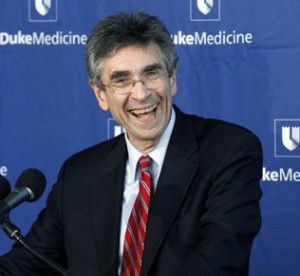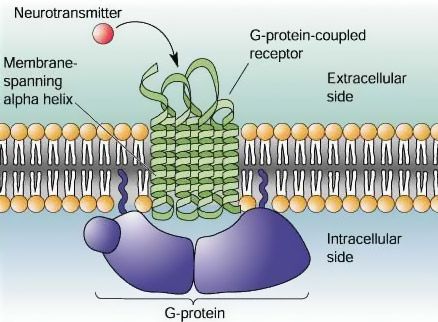2011 (231)
2012 (120)
2013 (207)
2015 (1)
2016 (85)



Nobel laureates’ work could lead to more effective medicines with fewer side effects
For the second time in a decade, a professor of pathology has been awarded a Nobel Prize. This time the recipient is Robert J. Lefkowitz, M.D., of Duke University Medical Center, who shares the 2012 Nobel Prize in Chemistry.
The prize committee based their decision on the potential of this laureate’s seminal discoveries, which could be used to develop more effective medicines. This work may also contribute to the development of companion diagnostic tests that could be offered by clinical laboratories.
Nobel Laureate’s Work Increases Understanding of How Medicines Work
In an October 10 press release, the Royal Swedish Academy of Sciences announced its decision to award the 2012 Nobel Prize in Chemistry to Dr. Lefkowitz, the James B. Duke Professor of Medicine, at Duke. Lefkowitz is also Professor of Pathology, and Professor of Biochemistry within Duke’s Department of Medicine, Medicine-Cardiology Division.
“Our research program is concerned with the molecular properties and regulatory mechanisms that control the function of plasma membrane receptors for hormones and drugs under normal and pathological circumstances,” Lefkowitz’ stated on his laboratory’s website.
The findings are a key to the workings of as many as half of all prescription drugs, as well as beta blockers and antihistamines, reported a story in the The Charlotte Observer. His discoveries carry the promise of more effective medicines that are less likely to cause side effects.
Lefkowitz will share the prize with his former student, Brian K. Kobilka, M.D., a Professor and Chair of the Department of Molecular and Cellular Physiology and Medicine at Stanford University School of Medicine.
Studies Pave the Way for a New Area of Pharmaceutical Research
Prior to the pair’s groundbreaking work, scientists did not fully understand the impact of drugs, such as beta blockers, antihistamines and various psychiatric medicines, on the human body. The work showed that receptors act as a kind of middleman to trigger the cell’s response to chemicals, the Charlotte Observer reported.
As early as 1968, Lefkowitz used radioactivity to trace receptors on cells. This gave him an initial understanding of how they work. In the 1980s, Kobilka successfully isolated the gene that codes for the receptor during the human genome study.
From there, the researchers discovered that there is a whole family of receptors—the G-protein-coupled-receptors—that look alike and function in the same way. There are around 1,000 such gene codes. They include receptors for light, flavor, odor, adrenalin, histamine, dopamine and serotonin, stated a story published by Genetic Engineering & Biotechnology News.
The receptors are called seven-transmembrane G protein-coupled receptors (GPCR), or “G-coupled receptors” for short. The serpentine GPCRs weave through the surface of the cell seven times, stated a story in Duke Today, the university’s research news publication. The receptors catch chemical signals from the outside and transmit their messages into the cell.
Subsequent to the 1980s, Lefkowitz’ team discovered that the GPCR actually sets two chains of events in motion:
- initiation of signaling that cascades into the cell and prompts it to respond in an appropriate way; and
- triggering of a second cascade based on a feedback signal that leads to desensitization.
“One important insight to come from our studies of receptors is that their properties are not fixed,” Lefkowitz stated on his website. “Rather, they are influenced by the hormones and drugs with which they interact, as well as by a variety of disease states.
There are important clinical implications of the ever-changing nature of the receptors. For example, this provides a basis for beginning to understand the phenomenon of drug tolerance, or desensitization, the diminishing effect of drugs over time.”
Another Pathologist Won a Nobel Prize in 2005
Pathologists and clinical laboratory clinical laboratory managers may recall that, seven years ago, the committee awarded the Nobel Prize in Medicine to another pathology professor, Australian J. Robin Warren, A.C., M.D., MBBS. Warren shared the 2005 award with Barry J. Marshall, M.D.. The committee recognized the pair for their discovery of the helicobacter pylori bacterium and its role in gastritis and peptic ulcer disease. That discovery changed the way most types of ulcers are treated.
Read more: Professor of Pathology Shares 2012 Nobel Prize in Chemistry | Dark Daily http://www.darkdaily.com/professor-of-pathology-shares-2012-nobel-prize-in-chemistry-1130#ixzz2EO8B1vyT



